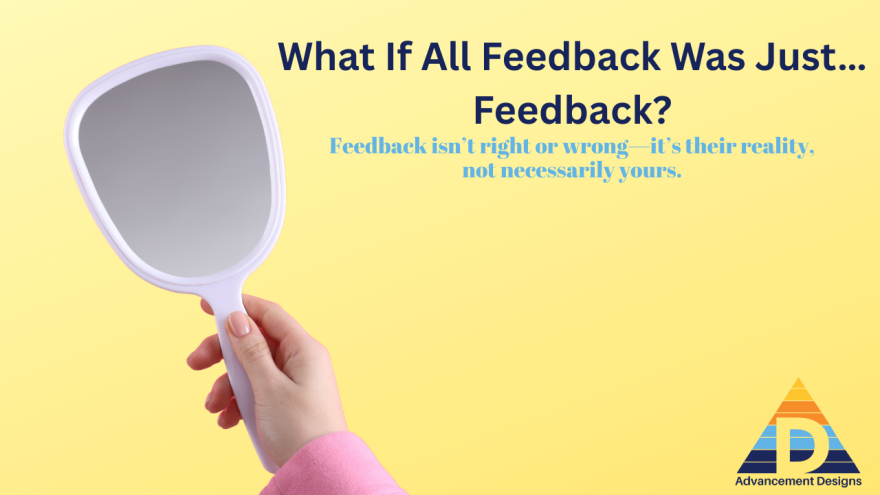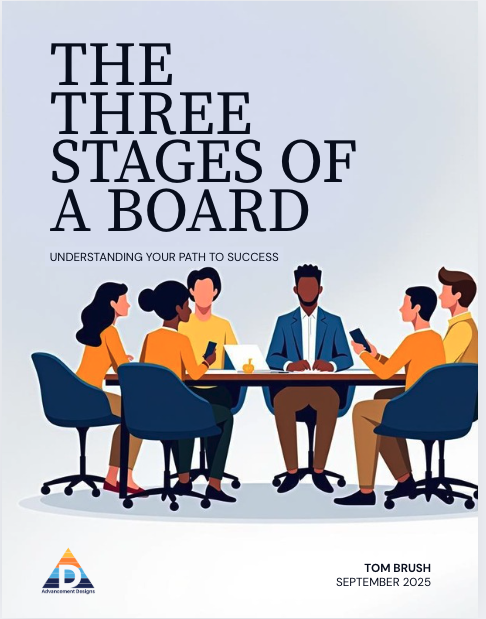BLOG - What If All Feedback Was Just… Feedback?
What If All Feedback Was Just… Feedback?
Feedback isn’t right or wrong—it’s their reality, not necessarily yours.

Whether you lead a nonprofit, a team, or just yourself, feedback shapes every decision you make. We chase it, resist it, and sometimes let it define us. But what if you stopped labeling feedback as good or bad—and started treating it as simply information?
That’s what this reflection is about: seeing feedback not as judgment, but as something real—a mirror that helps you learn and grow.
Feedback seems to be following you around lately, doesn’t it?
Let’s talk about it—because the way you view feedback might be holding you back more than you realize.
Last week, I had the chance to hear a Q&A with Lin-Manuel Miranda (creator of Hamilton) at my alma mater, Hamilton College. He shared how Stephen Sondheim gave him pages of feedback while he was writing Hamilton.
Miranda said he used most of it—but not all. At some point, he realized he had to stay true to what he believed, no matter how brilliant the source.
That hit home for me.
A few days later, a fellow Hamilton alum sent me feedback about my new book, The Renegade Nonprofit.
“It was hard to put down—quickest I’ve read something in a while.
The reflective theme is transferable to all aspects of work and life.”
That was incredibly kind. And it reminded me of how tricky feedback can be—because both the glowing kind and the painful kind can throw you off if you give them too much power.
I remember giving a conference presentation years ago where 95 percent of attendees said it was excellent and 5 percent said it was a waste of time.
Guess which group I obsessed over?
For a week, that 5 percent haunted me—until a coach said something that changed everything: “It’s all just feedback.”
That became my mantra. It all has value. Just not too much.
In The Renegade Nonprofit, I introduced a coach named Elena—she’s the one who says what I often need to remind myself.
As Elena puts it:
“Feedback isn’t a verdict; it’s a mirror. The goal isn’t to decide if you were right or wrong—it’s to see what’s real. What did you intend? What actually happened? What might you try differently next time?”
That perspective helped me stop judging feedback and start learning from it.
It’s the same shift Maya, the overwhelmed nonprofit leader in The Renegade Nonprofit, experiences when she realizes:
“I used to hear feedback as criticism. Now I’m learning to hear it as curiosity—an invitation to learn. When I stopped defending myself and started asking, ‘What can I see from their perspective?’ everything changed.”
When you stop labeling feedback as positive or negative, you start to see it as information—another perspective, another lens.
Feedback isn’t “right” or “wrong.” It’s simply what someone else believes or experienced. And when you can look at it that way, you open yourself to learning that would’ve stayed hidden behind your defenses.
As Elena reminds her clients:
“The best leaders aren’t the ones who get the most praise—they’re the ones who invite the hardest feedback and stay open enough to learn from it.”
So what about you?
When was the last time feedback taught you something real—something you wouldn’t have seen on your own?
Keep Learning What’s Real
If this reflection resonated, you’ll find more stories and lessons like it in my book, The Renegade Nonprofit.
It’s a story about leadership, learning, and letting go of “right vs. wrong.”
About Tom Brush
Tom Brush is a nonprofit coach, consultant, and author of The Renegade Nonprofit. Through his Renegade framework, he helps nonprofit leaders reject “best practices,” focus on what’s real, and carve their own pathways to success.

